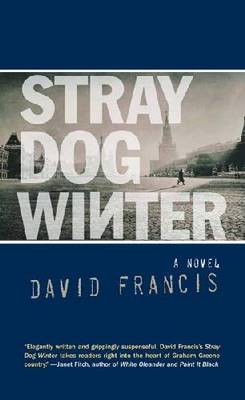Reviewed by brokentune on
I was drawn to Stray Dog Winter because of the following blurb:
"Darcy Bright, a restless young artist, receives a surprising birthday present from his elusive half-sister Fin: a ticket to the Soviet Union housed in a leather money belt. Together only briefly during their youth, Darcy and Fin are both estranged by the distance between them, and yet inextricably bound by the secrets of their childhood. So when Fin -- ostensibly in Moscow on a fellowship to paint industrial landscapes -- invites Darcy to join her there, her wary brother doesn't resist.
Soon after his arrival in the bleak Soviet winter, Darcy, already engulfed in Fin's mysterious new life there, becomes entangled in an extortion plot designed to change the course of Cold War history. And as the intricacies of their bond as brother and sister are revealed, Darcy uncovers Fin's involvement in an unexpected cause of her own, leading to a confrontation with profound and deadly consequences.
Atmospheric and suspenseful, "Stray Dog Winter" is a remarkable novel about love, passion, politics, and identity."
The problem is, that, while the blurb promises all the elements of a Greene novel, the writing just does not live up to it.
There we go again, my reading experience has been spoilt by my encounter with Graham Greene's work. The man has a lot to answer for!
In all seriousness, tho, the writing tries very hard to emulate the great Cold War thrillers, but falls flat. Where Greene, Le Carre, and Fleming all create an atmosphere of suspense and manage to do this with authority (some of which may have stemmed from them all having had first hand experience of what they were writing about), Francis' book reads like he tried very hard to copy the imagery from the films based on the great Cold War thrillers without capturing the sentiments of the underlying books.
In other words, although I have not read much of Stray Dog Winter, the onslaught of cliches and stereotypes, made me twitch.
It may well work for a James Bond to make reference to the brand names of the things he enjoys, but Fleming does so without attributing these products with any particular significance, nor would he expect the reader to gain any insight into the plot or a character by making these references. When our main character in Stray Dog Winter, Darcy, puts on his Ray Bans on arriving in Moscow, I got the feeling that the author tried to use some symbolism that just ended up having no meaning in the context of the story or character at all. And the sunglasses were not the only instance. Within the first three pages we already have....:
- "Darcy pulled up his Pentax and snapped a quick shot, feeling foreign, unaccountable."
- "....and flicked his half-done Popularne onto the tracks."
- "Fodor’s Moscow & Leningrad just said don’t take photos of anything strategic."
- "He pulled his faux-fur Kenzo coat about himself..."
I truly hate it when writers try to convey sentiments with brand names. It's so stupid. It is counter-productive to the art of writing, art of using words to describe and express.
And then there is Darcy, the main character, a young Australian art student from a broken home, who is travelling to visit his half-sister, who moved to Moscow. Darcy is naive and judgmental, which does not make him an endearing character, but what really irked me is that he jacks himself off to sleep to the idea of a border patrol soldier he watched from the train in one moment, and only a couple of pages on, he fantasizes about his half-sister?
To me that's an indication that there is not enough in the Cold War aspects of the story to make up the book and the author needed to clutch on some other straws to create a "thrilling" read.
I might be wrong. There may be more to the book than the indications I have picked up from the small part I have read, but I have the strong feeling that there will be a lot of eye-rolling and head-scratching ahead and that any hopes for a noir mystery thriller will be disappointed in favour of some contextless capers.
Reading updates
- Started reading
- 22 May, 2016: Finished reading
- 22 May, 2016: Reviewed
